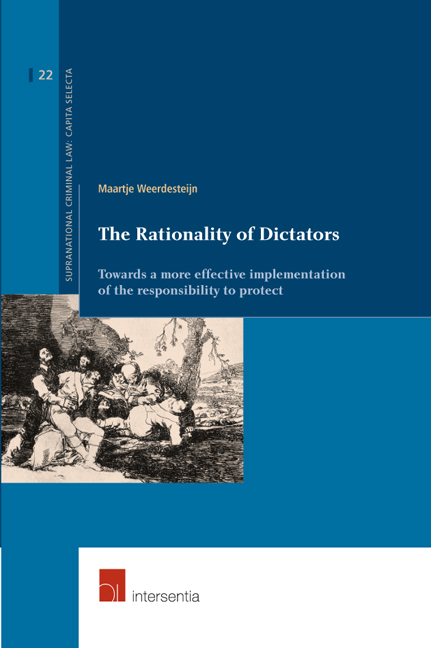 The Rationality of Dictators
The Rationality of Dictators from Part I - The Theory
Published online by Cambridge University Press: 28 September 2018
INTRODUCTION
In previous chapters the characteristics of dictators and dictatorial regimes have been discussed as well as the responsibility of the international community to stop the worst atrocities that are perpetrated by them. When a dictator manifestly fails to protect his population from atrocity crimes or is even complicit in their perpetration, the international community may intervene through the UN Security Council to implement the third pillar of the responsibility to protect. Foreign policy mechanisms that may be used to persuade a dictatorial leader to stop the perpetration of crimes are diverse, and range from diplomacy to sanctions and sometimes even military intervention. These mechanisms are not only intended to emphasize the importance of respect for human rights but also aimed at changing the policies of perpetrating countries (Luard, 1980, p. 579). As Tetlock specifies ‘foreign policy is fundamentally social influence: The ultimate objective is to persuade other nations to act in desired ways’ (Tetlock, 1983, p. 69). Although often the international community fails to stop the crimes (LeBor, 2006), the domestic policies of dictators might be impacted by the actions of the international community or other states depending on whether the leader will be responsive to the foreign policy mechanisms and modify his tactics that bring about the suffering. In some instances, this means coercing the target state to change its behaviour by threatening the adversary with enough pain that this would outweigh the benefits of resisting the demands for change (Byman & Waxman, 1999, p. 107). That the decision-making process would be done in such a rational manner, however, has been challenged by scholars who pointed to the inability of human beings to live up to the assumptions underlying perfect rationality and has raised issues relating to the level of analysis that is being investigated (a.o. Stein, 2012). The question becomes whether rationality is attributed to the state or to the individual and what the implications of choosing a particular level of analysis are for examining a state's foreign policy (Carlsnaes, 2012). What determines the reaction of a state to foreign policy measures directed at it, and what is the role of the individual therein?
To save this book to your Kindle, first ensure [email protected] is added to your Approved Personal Document E-mail List under your Personal Document Settings on the Manage Your Content and Devices page of your Amazon account. Then enter the ‘name’ part of your Kindle email address below. Find out more about saving to your Kindle.
Note you can select to save to either the @free.kindle.com or @kindle.com variations. ‘@free.kindle.com’ emails are free but can only be saved to your device when it is connected to wi-fi. ‘@kindle.com’ emails can be delivered even when you are not connected to wi-fi, but note that service fees apply.
Find out more about the Kindle Personal Document Service.
To save content items to your account, please confirm that you agree to abide by our usage policies. If this is the first time you use this feature, you will be asked to authorise Cambridge Core to connect with your account. Find out more about saving content to Dropbox.
To save content items to your account, please confirm that you agree to abide by our usage policies. If this is the first time you use this feature, you will be asked to authorise Cambridge Core to connect with your account. Find out more about saving content to Google Drive.